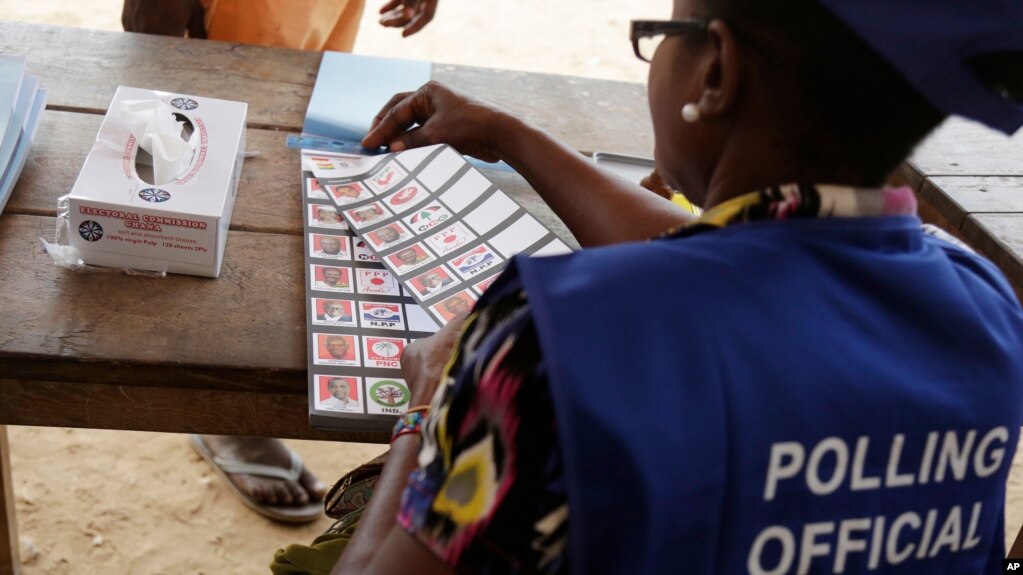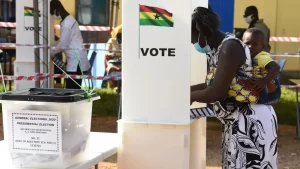Ghana’s 2024 Elections: What’s at Stake for the Future of the Nation
4 min read
An electoral official tears a presidential ballot paper during the Presidential and parliamentary election, in Kibi, eastern Ghana, Dec. 7, 2016.

An electoral official tears a presidential ballot paper during the Presidential and parliamentary election, in Kibi, eastern Ghana, Dec. 7, 2016.
Ghana will hold a presidential election in December 2024, which will determine the country’s next leader as current President Nana Akufo-Addo completes his second and final term. The two leading candidates in the race are Vice President Mahamudu Bawumia and former President John Mahama, both of whom have deep political roots in the country.
The Candidates and the Stakes
Mahamudu Bawumia, the 61-year-old vice president from the New Patriotic Party (NPP), has served under President Akufo-Addo since 2016. A well-known economist educated at Oxford University, Bawumia is often lauded for his financial expertise, especially in managing Ghana’s economic policies. However, his tenure has also been marked by criticism of the country’s worsening economic crisis. Ghana’s economy, which has struggled with high inflation and public debt, is one of the central issues in the election. If elected, Bawumia could make history as Ghana’s first Muslim president, a significant milestone in the country’s politics.
John Mahama, 65, is the candidate for the National Democratic Congress (NDC). He previously served as Ghana’s president from 2012 to 2017 but lost his bid for re-election in 2016. Mahama has positioned himself as a leader with experience capable of addressing the nation’s economic challenges. During his previous term, he faced criticism for frequent power outages, which earned him the nickname “Mr. Dumsor.” In the face of Ghana’s ongoing economic difficulties, Mahama has promised a bold “urgent reset” to restore stability and alleviate poverty. His comeback bid seeks to capitalize on his political experience and address the mounting discontent with the current government.
Other candidates making waves include Nana Kwame Bediako, a businessman and social media influencer, who has gained a following among the youth despite lacking a formal political background. Alan Kyerematen, a former minister in the NPP, also has a significant following, particularly in the Ashanti region, where he enjoys support from members of his former party.
Key Issues Facing the Nation
As election day approaches, economic issues are dominating public discourse. Ghana has struggled with inflation, which soared to 54% by the end of 2022, pushing thousands of Ghanaians into poverty. The World Bank reports that up to 850,000 people may have fallen below the poverty line as a result of rising costs. The country’s budget has been severely strained, leading Ghana to seek assistance from the International Monetary Fund (IMF). Unemployment, especially among the youth, and the migration of many Ghanaians in search of better opportunities abroad, are also key concerns for voters.
The NPP, led by Bawumia, has defended its economic record, arguing that the country is on the verge of transformation. However, the NDC and Mahama have criticized the government’s economic management, calling for a comprehensive reset to reverse the country’s downward trajectory.
Another major issue in the election is the environment, particularly the rampant illegal gold mining, known as “galamsey.” This unregulated activity has caused severe environmental damage, polluting rivers and forests with toxic chemicals. Both major political parties agree that the problem needs urgent attention. The NPP has called for a balanced approach that allows small-scale miners to continue working, while the NDC advocates for stricter regulations and a ban on new mining licenses.
How the Election Works

The election will take place on December 7, 2024, when voters will choose both a president and parliamentary representatives. Ghana has a two-round system for presidential elections. If no candidate wins more than 50% of the vote in the first round, a runoff between the top two candidates will be held before the end of the month. The parliamentary election will use a first-past-the-post system, where the candidate with the most votes in each constituency wins, even if they do not secure a majority.
Voters will need to present their voter ID cards and undergo fingerprint checks at polling stations before receiving two ballots—one for the presidency and one for parliamentary candidates. Voters will also have their little fingers marked with indelible ink to prevent double voting.
A History of Peaceful Elections
Since the reintroduction of multiparty democracy in the early 1990s, Ghana has been known for its peaceful and transparent elections. Previous elections have been closely contested, with narrow margins, especially in 2008 when the second-round result was decided by less than half a percentage point. The 2012 election was similarly close, with Mahama winning by just 80,000 votes, prompting a legal challenge from the NPP, although the result was upheld. International observers have frequently praised Ghana’s electoral process for its transparency.
What to Expect After the Vote
Election results are typically announced by the Electoral Commission within a few days of voting, with the final count expected by December 10, 2024. With high stakes surrounding economic recovery, job creation, and environmental concerns, the outcome of this election will be crucial for Ghana’s future. As the country prepares to choose its next president, the 2024 elections are shaping up to be one of the most consequential in recent history.